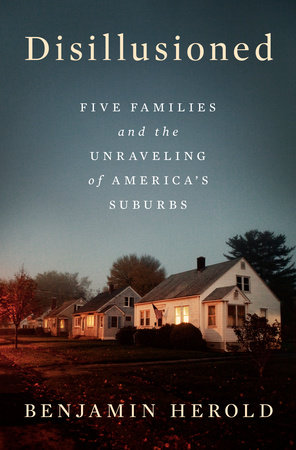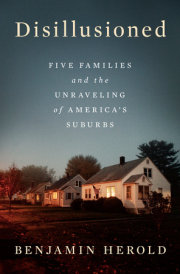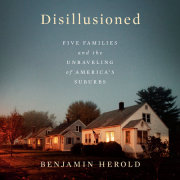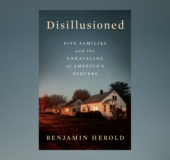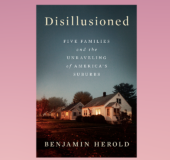INTRODUCTION I’m furious and disappointed.
—Nika Robinson
The Robinson Family Gwinnett COUNTY, Georgia
Nika Robinson loaded her Nissan Altima with all the jeans and sweatshirts and toys her children had outgrown during the past year. It was the kind of bright August morning when you couldn’t help but feel good, with a rising summer sun already warming her dark brown arms. For months, everything had been a struggle, leaving Nika drained and irritable, a shadow of her usual bubbly self. But a looming change of season whispered on the breeze. The 2019–20 school year had just begun. So far, things had unfolded smoothly. A few hours earlier, Nika’s husband and teenage son had headed out the door for work and for school, sleepy and cute as they mumbled goodbye. Carter and Cassidy, suddenly second and fourth graders, were happy and laughing as they ate their cereal at the kitchen island. Now, with her schedule free for the first time in forever, Nika felt almost relaxed. The end-of-summer consignment sale at the Gwinnett County Fairgrounds was about to start. It would be like a little reward for keeping everyone intact.
Nika climbed into the driver’s seat and slid forward. At just over five feet tall, she stood a full twelve inches shorter than her husband, Anthony
Robinson, once a lean and powerful high school linebacker, now built more like a bulky defensive tackle. The two had met in 2003, when they were in their early twenties, back when nearby Atlanta still had space for all the pent-up hopes of America’s booming Black middle class. At the time, she had just earned her master’s degree in public health. He was working as a network engineer. After they got married, there wasn’t much debate. Upwardly mobile families like theirs lived in the suburbs. By 2012, the Robinsons had settled in a six-bedroom, three-bathroom, $223,000 house in one of the whitest parts of northern Gwinnett, forty-five minutes from downtown.
Nika still wanted to believe it had been the right decision. Now in her early forties, it had become habit to push any nagging doubts about the life she’d built below the surface of her busy days, which were typically filled with work, parenting, and courses in the doctoral program she’d recently started at the University of Georgia. Just that morning, Nika had caught her self staring again at the dining-room walls, which remained the same neutral beige as the day they’d moved in. Weeks earlier, she and Anthony had bought several shades of blue paint in the small sample-size cans, then put a series of squares on the wall, one row running from Blueprint to Gentle- man’s Gray, another from Van Cortland to Indigo Batik. But even after hiring a color consultant to offer advice, Nika felt unable to commit.
It was a problem for another time, she thought as she backed her car out into the cul-de-sac, then passed her neighbors’ homes, their still-skinny front-yard trees and empty concrete driveways spaced at regular intervals. The condominium complex for active adults scrolled by, followed by the community’s gated pool and fenced-in tennis courts. Everything was calm. As they so often did, Nika’s thoughts circled back to her oldest son, Corey.
Now fourteen, he was a bowling ball of a boy, short and stout, with a complexion like hers. A running back. He’d just started ninth grade at Mill Creek High, widely regarded as one of the best schools in the county. It was a big reason she and Anthony had picked the house and neighborhood they did.
A favorite daydream returned after a long absence. Where might her son go to college? What would he study? Where would he work, live, raise a family of his own? Nika let her mind roam over the possibilities. She’d grown up in Buffalo, New York, then gone to undergrad in Rochester before making the big jump to Emory University in Atlanta for her master’s. Corey was more likely to go to a historically Black college, she figured. Just like his father, who studied math and physics at Clark Atlanta. Nika could already picture her baby boy in his gown, holding his degree, posing for pictures.
It was good to feel such ease again. For much of the summer, the Backpack Incident had been replaying on an endless loop in her mind. Thanks to Corey’s adolescent relationship with the truth and her own contentious relationship with the Gwinnett County Public Schools, Nika had limited visibility into the details of what had actually happened. But it clearly signaled a dangerous escalation. The trouble had started soon after Corey began seventh grade at Jones Middle School. First, it was a series of citations and detentions handed out by white teachers who complained that he was disrespectful and took too long in the bathroom. Nika and Anthony weren’t the type of parents to kid themselves. They knew their son was loud and liked to clown around. They got on him about moderating his volume, watching his manners, regulating his tone, tempering his physicality. But then Jones staff classified an accidental collision between Corey and another boy as “Behav phys inj,” a code that fell under the district’s rules for assault and battery. It was while trying unsuccessfully to get that removed from her son’s record that Nika heard about the Backpack Incident. By now, the spotty details she’d pieced together fell like dominos in her mind. The white boy who had reported a missing necklace. The school police officer who had searched the bags of Corey and another Black student. The teachers who didn’t bother to call home. The lack of an apology after the necklace couldn’t be found.
Before things could get any worse, Nika had pulled Corey out of Jones Middle and sent him to live with Anthony’s parents in neighboring DeKalb County for the rest of seventh grade. She also began researching a private Christian academy that reminded her of the private school she’d attended as a teenager back in Buffalo. But Anthony was cautious about money, and Corey wanted to be with his friends for eighth grade, so Nika had let the matter drop.
During those first few months back at Jones, her daydreams of college were crowded out by fears that Corey might end up in Gwinnett County’s notorious disciplinary school, the GIVE Center. If that happened, what would be next? Dropping out? Prison?
But the call never came.
Still, for much of the past summer, the family had argued again about private school. Nika wanted to make the transition for ninth grade, before Corey became attached to a new group of friends. She scheduled interviews with the school’s academic adviser, even arranged for her son to work out with the football team. But Anthony was torn. They were already paying al- most $4,000 a year in property taxes so they could send their children to the best public schools in Gwinnett County. How did paying more than $12,000 a year in tuition on top of that make sense? And what about Cassidy and Carter? Would they have to go to private school too?
Grudgingly, Nika had relented, again. Mill Creek High enrolled nearly 3,700 students. Three fourths scored proficient or advanced in both reading and math. The morning of Corey’s first day, Nika had been worried sick.
To her relief, though, things seemed to be going great. Corey had already made the JV football team. He was also taking Geometry, putting him ahead of most other freshmen in the state. And he had quickly become Mr. Popularity, attracting a wide cross section of friends with his constant jokes. When her son came home from those first few days of school smiling and relaxed, Nika finally exhaled. Now she began to chastise herself just a bit. Perhaps she was being overprotective, Nika thought as she neared the turn-off for the Gwinnett County Fairgrounds. Too focused on the negative, ungrateful for the blessings her family enjoyed. Maybe the dots she’d been connecting into the shape of some systemic problem really were just a series of unrelated incidents.
She parked the Altima and climbed out of her seat. The midday sun wrapped her in a warm embrace. Back when Gwinnett was mostly rural and white, the sprawling fairgrounds complex had been home to rodeos and livestock competitions. Now it hosted a steady stream of craft fairs and dog shows.
Nika gathered her things and headed inside, joining a throng of middle- class moms who were African American and Korean American and Nigerian American and Mexican American and multiracial and white. She drifted through 9,600 square feet of floor space that filled up each year with Spider-Man T-shirts and Lego bins and a small army of
Frozen snowmen who stared goofily at passersby. Nika found the smartly organized totems of childhood soothing. Everything where it belonged. Smiling, she began hanging her family’s old clothing on the for-sale racks.
Then her phone buzzed in her purse. It was one of Mill Creek’s assistant principals. He’d just handed Corey a long suspension. Nika would later learn that her son had been slap-boxing in the locker room with a teammate, more horsing around than trying to hurt each other. But someone had recorded the boys jumping around, and a bunch of laughing students had crowded around a cell phone to watch, drawing the attention of administrators who classified what happened as a fight. Nika heard the assistant principal say the harsh punishment he’d meted out was partly a result of her son’s past disciplinary record, which included the prior “assault” charge she’d been unable to get expunged from his record. Everything mooring Nika to the present moment seemed to dissolve.
Inside the Gwinnett County Fairgrounds, surrounded by sneakers and strollers and exersaucers, she began to shake. A wave of anger crashed over her, then receded, only to be replaced by something like grief. She burst into tears. A stranger had to help her back to her car. Nika forgot all about the clothes and toys she’d come to sell, leaving them in a pile on the floor.
“I’m furious and disappointed,” she told me later. “I should have sucked it up and paid to send him to the school I thought would be a better fit.”
Copyright © 2024 by Benjamin Herold. All rights reserved. No part of this excerpt may be reproduced or reprinted without permission in writing from the publisher.

